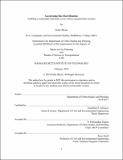| dc.contributor.advisor | Frederick P. Salvucci. | en_US |
| dc.contributor.author | Blynn, Kelly (Kelly Mavis) | en_US |
| dc.contributor.other | Massachusetts Institute of Technology. Department of Civil and Environmental Engineering. | en_US |
| dc.date.accessioned | 2018-05-23T15:04:06Z | |
| dc.date.available | 2018-05-23T15:04:06Z | |
| dc.date.copyright | 2018 | en_US |
| dc.date.issued | 2018 | en_US |
| dc.identifier.uri | http://hdl.handle.net/1721.1/115600 | |
| dc.description | Thesis: M.C.P., Massachusetts Institute of Technology, Department of Urban Studies and Planning, 2018. | en_US |
| dc.description | Thesis: S.M. in Transportation, Massachusetts Institute of Technology, Department of Civil and Environmental Engineering, 2018. | en_US |
| dc.description | This electronic version was submitted by the student author. The certified thesis is available in the Institute Archives and Special Collections. | en_US |
| dc.description | Cataloged from student-submitted PDF version of thesis. | en_US |
| dc.description | Includes bibliographical references (pages 136-143). | en_US |
| dc.description.abstract | With growing agreement that credible pathways to zero carbon electricity exist, many support the notion that widespread electrification of the transportation sector will be an essential strategy for meeting scientifically-based midcentury climate goals. While transit buses have a relatively small impact on greenhouse gas emissions, they have a larger impact on urban air quality, have commercially available in-service electric models, and have historically commercialized clean technologies that enabled deployment in the rest of the heavy duty vehicle sector. This thesis seeks to understand what factors hinder or enable transit agencies to go beyond initial pilots to largely or wholly electrify their fleets, with the goal of understanding potential policies and strategies that could accelerate such a transition, without inhibiting existing or expanded transit service that also plays a key role in reducing carbon emissions, in order to improve local air pollution and support accelerated electrification of trucks and other heavy duty vehicles. Using public transit fleets in California, Kentucky, and Massachusetts as case studies, this thesis utilizes quantitative total cost of ownership and well-to-wheels greenhouse gas and air pollutant emissions analysis, and analysis of qualitative interviews with transit agency representatives to investigate the barriers, drivers, and potential solutions that could hinder or enable an accelerated yet sustainable transition to an electrified bus fleet. A total cost of ownership analysis reveals that electric buses may already be more cost effective than diesel buses in many case study utility service areas primarily due to fuel and maintenance cost savings, but are sensitive to key parameters such as annual mileage, electricity tariffs that vary widely by location, fossil fuel costs, policy context, and anticipated maintenance savings, and that cost savings from electric buses are likely to increase over time primarily due to anticipated reductions in battery costs and a faster increase in fossil fuel prices than electricity prices. While multiple agencies interviewed in California were planning to fully electrify their fleets, primarily due to political pressure and internal leadership, outside California where less supportive policies exist, fewer agencies were planning to procure additional electric buses, primarily due to high first cost and undesirable tradeoffs with maintaining or expanding transit service levels. Interview respondents reported other substantial barriers as well, such as oversubscribed discretionary grant programs, charging infrastructure costs, electricity costs, additional operational complexity, and performance uncertainty and risk, suggesting a need for multiple complementary policies to overcome these barriers and ensure agencies can transition to a new technology without impacting service. Important interventions identified include pursuing favorable electricity tariffs and electric charging infrastructure incentives through regulatory changes, and further leveraging limited public funds such as the Volkswagen settlement to develop low cost financing approaches similar to those utilized in the clean energy sector that can pledge anticipated operating savings to afford the incremental upfront cost. A set of complementary policies is then recommended to accelerate bus fleet electrification in each case study context, in order to achieve carbon reduction and air quality improvements for low income, urban communities without impacting transit service levels, and to help lead the way for the transition of other heavy duty fleets. | en_US |
| dc.description.statementofresponsibility | by Kelly Blynn. | en_US |
| dc.format.extent | 143 pages | en_US |
| dc.language.iso | eng | en_US |
| dc.publisher | Massachusetts Institute of Technology | en_US |
| dc.rights | MIT theses are protected by copyright. They may be viewed, downloaded, or printed from this source but further reproduction or distribution in any format is prohibited without written permission. | en_US |
| dc.rights.uri | http://dspace.mit.edu/handle/1721.1/7582 | en_US |
| dc.subject | Urban Studies and Planning. | en_US |
| dc.subject | Civil and Environmental Engineering. | en_US |
| dc.title | Accelerating bus electrification : enabling a sustainable transition to low carbon transportation systems | en_US |
| dc.type | Thesis | en_US |
| dc.description.degree | M.C.P. | en_US |
| dc.description.degree | S.M. in Transportation | en_US |
| dc.contributor.department | Massachusetts Institute of Technology. Department of Civil and Environmental Engineering | |
| dc.contributor.department | Massachusetts Institute of Technology. Department of Urban Studies and Planning | |
| dc.identifier.oclc | 1036985839 | en_US |
